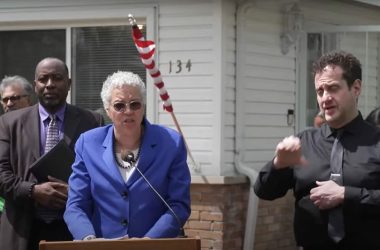Would Violate Free Speech, Discriminate Against LGBT People
Moscow–(ENEWSPF)–December 11, 2012. Russia’s parliament should reject a proposed bill that would violate Russians’ freedom of expression and discriminate against and stigmatize Russia’s lesbian, gay, bisexual, and transgender (LGBT) community.
On December 19, 2012, the Duma, the lower chamber of parliament, is scheduled to discuss draft provisions that would impose fines on individuals, government officials, and organizations that engage in “promoting” homosexuality to anyone under the age of 18. The discussion comes less than two months after the United Nations Human Rights Committee ruled that a similar measure adopted by a regional Russian legislature violated freedom of expression and was discriminatory, and a week after Prime Minister Dmitry A. Medvedev said he was against such laws and that “not all relations between people can be regulated by law.”
“The proposed provisions attack the fundamental right to free speech, deny LGBT people equal rights, and violate Russia’s obligations under international and Russian law,” said Boris Dittrich, advocacy director of the LGBT program at Human Rights Watch. “Russia should listen to its prime minister, abide by its international commitments, and drop this homophobic bill.”
The bill would amend Russia’s Code of Administrative Law Violations. Under these amendments, individuals found responsible for “propaganda for homosexuality among minors” would face fines of up to 5,000 rubles (US$160), and organizations would face fines of up to 500,000 rubles (US$16,000). Similar laws banning “homosexual propaganda” have been adopted in nine Russian regions and are pending in another seven.
The bill does not define the terms “propaganda,” “homosexuality,” or “among minors.”
“The draft law’s language is so vague that it could undermine any public efforts to address rampant discrimination of LGBT people in Russia,” Dittrich said.
The UN Human Rights Committee ruled in October that a measure banning “homosexual propaganda” adopted by the Ryazan regional legislature was “ambiguous and discriminatory.” The ruling found that Russia violated the rights of an LGBT activist, Irina Fedotova, to freedom of expression and protection from discrimination by prosecuting her under the Ryazan law. Police in Ryazan had detained Fedotova briefly in 2009 for displaying posters that read “Homosexuality is normal” and “I am proud of my homosexuality” near a secondary school. She was charged with “propaganda for homosexuality … among minors” for which a court fined her 1,500 rubles (US$30).
The committee ordered Russia to reimburse Fedotova for the fine and her legal expenses and to pay her additional compensation. The committee also reminded Russia of its obligation “to prevent similar violations in the future and [to] ensure that the provisions of the domestic law are made compatible with” articles of the International Covenant on Civil and Political Rights upholding freedom of expression and banning discrimination.
“It is profoundly disappointing that after the committee’s ruling, Russia is now pushing for homophobic legislation at the federal level,” Dittrich said. “Instead, the authorities should be following the committee’s ruling in the Fedotova case and undoing the discriminatory regional regulations.”
In May, a prominent Russian LGBT rights activist, Nikolai Alekseev, became the first person to be fined under a similar new law in St. Petersburg after he picketed city hall with a poster declaring “Homosexuality is not a perversion.”
Nationalist groups in Russia’s capital have publicly called for banning “homosexual propaganda” in Moscow and for closing gay clubs. Days after one of these statements, in October, masked men attacked an LGBT event in a gay-friendly Moscow bar. The attack is being investigated with no tangible results so far.
Conservative groups sued Madonna for violating the St. Petersburg legislation by stating her support for gay rights and distributing rainbow flags and pink bracelets at her August concert there. A St. Petersburg court ruled against the plaintiffs. Such groups also called for teenagers to be barred from attending concerts by Lady Gaga, who performed in St. Petersburg on December 9 and is scheduled to perform in Moscow on December 12. The performer has spoken out in favor of LGBT rights in Russia.
In its explanatory memorandum that accompanied the draft federal law, its sponsors justified the amendments as necessary “to ensure the intellectual, moral and mental protection of children.” However, the European Court of Human Rights has repeatedly affirmed that the desire to “protect” children from information about homosexuality is not justified by the principle of best interests of the child, and found such measures to be discriminatory.
Additionally, the UN Committee on the Rights of the Child reiterated in 2003 that the Convention on the Rights of the Child requires “appropriate and timely information which … enables them [children] to deal positively and responsibly with their sexuality in order to protect themselves from HIV infection.” The committee also urged countries to “refrain from censoring, withholding or intentionally misrepresenting health-related information, including sexual education and information.”
Human Rights Watch urged the European Union to voice concern over homophobic measures in Russia during the December 21 EU-Russia summit meeting in Brussels.
Source: http://www.hrw.org








